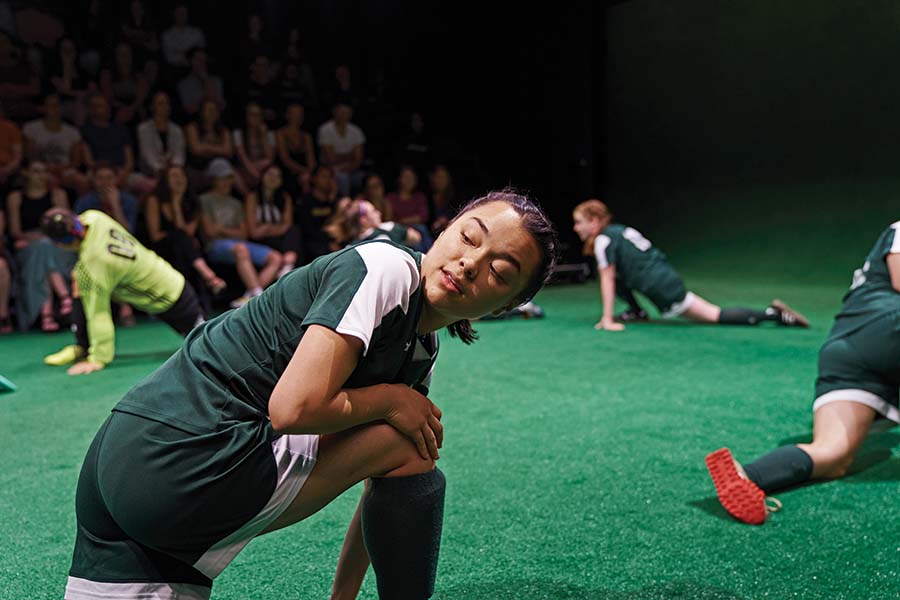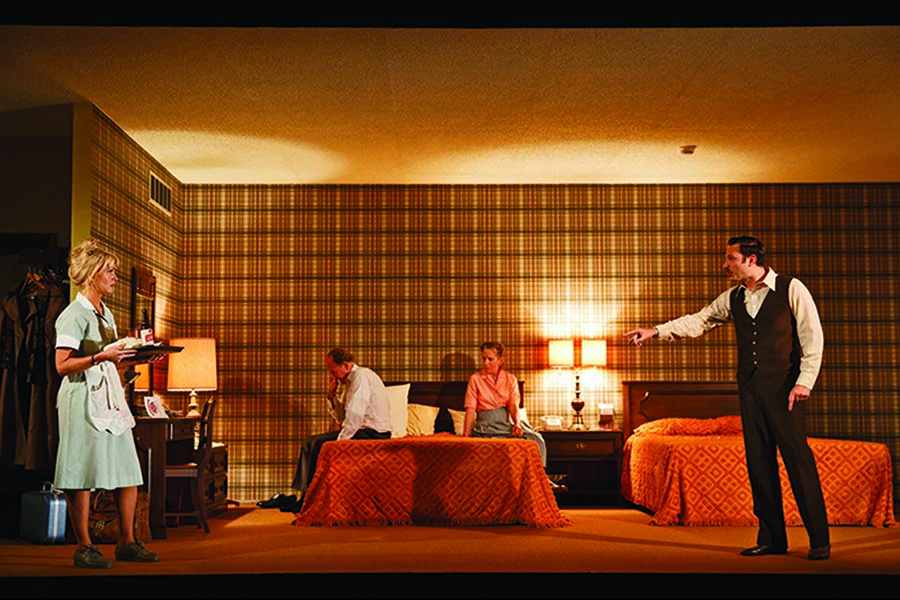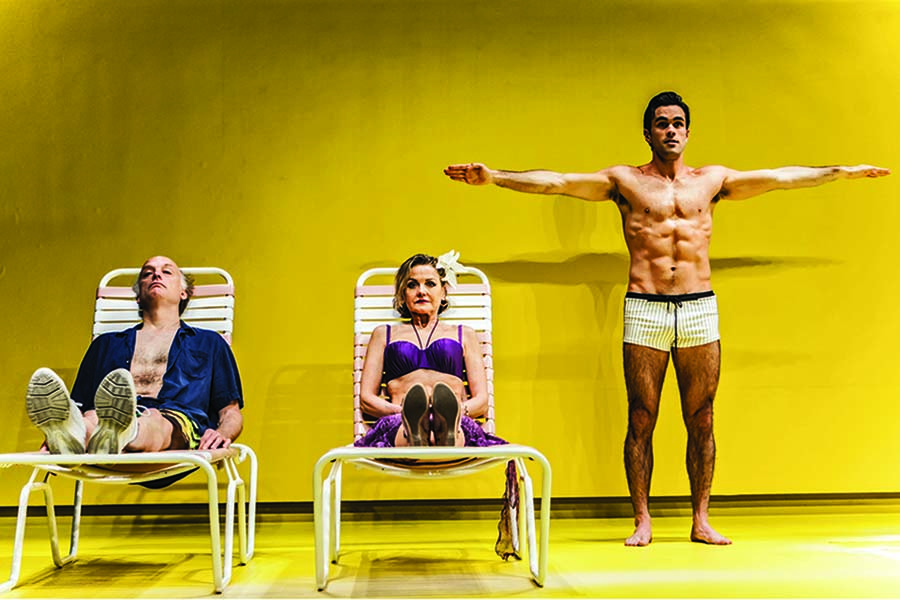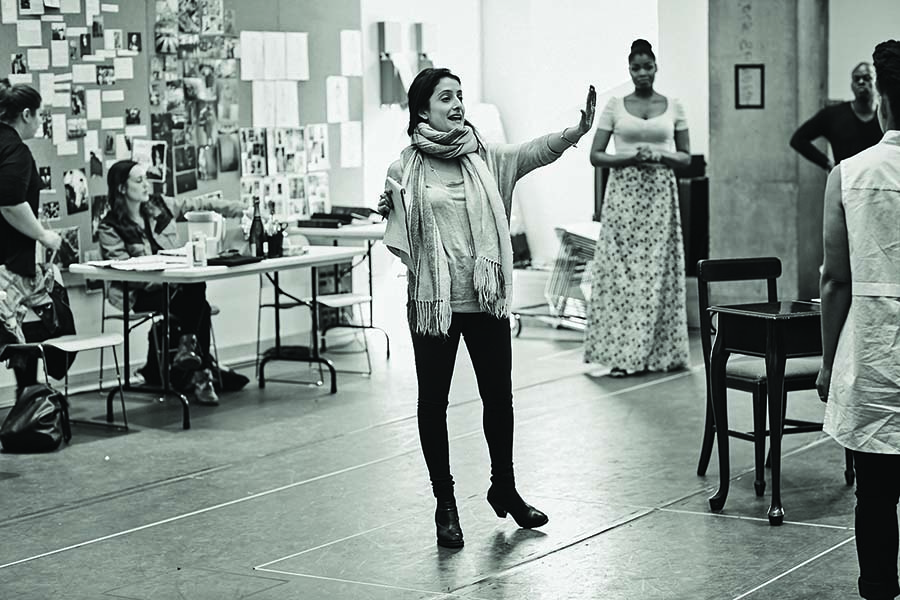It’s hard to start a profile of Lila Neugebauer without first mentioning that her theatre debut was as a performer in the first musical by Lin-Manuel Miranda (perhaps you’ve heard of him?) when they were both at Hunter College High School in New York City. Neugebauer was in 7th grade; Miranda was in 12th. It was the school’s annual spring student-written show; Neugebauer played a partygoer. She had braces and a bowl haircut, as many of us do in our tween years.
Her tie to the omnipresent Hamilton creator may be intriguing, but it’s not what has given this young director a busy, acclaimed career. Neugebauer (pronounced NOY-guh-bow-er) has seemingly catapulted onto the New York and regional scene—though, as with any “breakthrough” moment, it’s been years in the making. Most recently, she directed Sarah DeLappe’s The Wolves at the Playwrights Realm (it ran roughly from September through December, thanks to producer Scott Rudin). In the midst of that run her theatre company the Mad Ones, of which she’s one of four co-artistic directors, premiered Miles for Mary at the Bushwick Starr in Brooklyn; they’re currently the company in residence at Ars Nova. This year, she’s helming Branden Jacobs-Jenkins’s Everybody, a riff on the 15th-century morality play Everyman, at Signature Theatre starting Jan. 31, and Annie Baker’s The Antipodes at the same theatre in April.
“It’s the spring of Neugebauer!” Jacobs-Jenkins jokes. “We’re all going to be ‘Neugebauered.’”
While she didn’t study theatre in college (she was an English major at Yale), Neugebauer’s first professional forays out of school were internships in the literary departments of Chicago’s Steppenwolf Theatre Company and California’s Berkeley Repertory Theatre, where she met Les Waters, who would sit and read the paper on a bean bag chair by her desk. The English director, now artistic director of Kentucky’s Actors Theatre of Louisville, became “an incredibly important mentor,” Neugebeaur recalls. “He was the first person to tell me I was a director.”
Waters would later bring her into the fold at Actors Theatre, where she was a directing intern for a year (the Mad Ones came together during this time). She eventually directed on the mainstage at Actors Theatre’s Humana Festival, most recently with Dorothy Fortenberry’s Partners in 2014.
“When you’re a young director, what can come to the forefront in a rehearsal room is your need to control the room, to show that you’re a director,” says Waters. “Lila brings Lila Neugebauer into the room. I never thought she struggles to be who she is. She’s not acting being a director. She’s a director whose name is Lila Neugebauer. And I think it’s rare to know that so early.”

Neugebauer’s early relationships, both with institutions and individuals, have been key to her success. Her mini-season at Signature provides many examples. For one thing, she met Annie Baker walking up a hill in the Marina District in San Francisco after a workshop of Baker’s play Body Awareness at the Bay Area Playwrights Festival in 2007, when Neugebauer was at Berkeley Rep. Though she hasn’t directed anything by Baker in New York, Neugebauer has helmed many of the playwright’s regional debuts, including The Aliens at San Francisco Playhouse in 2012.
Baker also introduced Neugebauer to the “magnanimous, beneficent life force” that was the late Signature founder and Juilliard School director Jim Houghton, who brought in Neugebauer to direct student productions at Juilliard, a job she maintains to this day. (She directed Jacobs-Jenkins’s Appropriate there in December.) Her first gig at Signature was A.R. Gurney’s The Wayside Motor Inn in 2014, after which Houghton personally tapped her to direct The Signature Plays—a series of one-acts including Albee’s The Sandbox, Fornés’s Drowning, and Adrienne Kennedy’s Funnyhouse of a Negro—at the end of the 2015-16 season, Houghton’s last as artistic director before his death in August 2016 from stomach cancer.
“There’s not a person in this community who encountered Jim—whether it was briefly or over the course of his 25 years running that theatre—who won’t attest to the way that man changed their life,” she says, speaking slowly and carefully, as if holding back tears. “He certainly changed mine. I don’t know a greater gift than an artistic home for an artist.”
While Baker and Jacobs-Jenkins each asked Neugebauer to direct their plays, it was Houghton who gave her his blessing to helm two shows in the same season in close succession. Jacobs-Jenkins’s Everybody deals with “the summoning of every man to death,” and investigating the piece in the wake of Houghton’s passing has “felt reverberative and complex and meaningful.”

When Neugebauer talks about the people she loves and experiences that have shaped her, her emphasis and vocabulary heighten; though petite, she has a way of confidently commanding a conversation. Adjectives and adverbs pepper her speech as she describes her friends. Jacobs-Jenkins is “riotously hilarious”; she believed in The Wolves “vociferously” since first reading the play. She describes experiences as “revelatory” (the time she directed her first play as a high school senior, or devising work for the first time with the Mad Ones) and “transformative” (directing The Signature Plays).
“I talk a lot and she also talks a lot, and we just have this experience where we get to this whole new level of talk, and it’s unique and magical and strange,” says Jacobs-Jenkins, adding that Neugebauer is the first director he’s worked with who speaks as much as he does. “We haven’t yet exhausted each other. I feel like I’m always exhausting people, and I think she feels the same way.”
Neither can remember exactly when they first met, but the roots of their relationship go back to their first experience together at Humana in 2013. Jacobs-Jenkins’s Appropriate premiered that year, and Neugebauer directed Mallory Avidon’s O Guru Guru Guru, or why I don’t want to go to yoga class with you. Jacobs-Jenkins was immediately struck by her and her work; when he saw The Wayside Motor Inn, he knew he had to work with her.
“Her sense of composition is pretty amazing—that’s one of her superpowers,” says Jacobs-Jenkins. “She’s just got this incredible eye for stage pictures.”
Jacobs-Jenkins has worked with several different directors, while Baker has worked with few, most named Sam Gold. Baker says, though, that she immediately thought of Neugebauer when she conceived the play.
“Working with Lila is about being part of a constant, expansive, ongoing conversation with someone who is so passionate about the theatre that it radiates off her,” Baker writes via email. “She’s dark and funny and perfectionistic, but isn’t jaded about all the possibilities for the medium. She’s very trusting, and gives you space when you need it, but also gives brilliant notes and asks all the right questions.”
Both Baker and Neugebauer are mum on details about The Antipodes, though Baker notes that it’s an ensemble piece, and Neugebauer describes it as being about “a group of people making something.” According to Baker, one of Neugebauer’s strengths is her ability to work with actors and ensembles. Jacobs-Jenkins echoes this, as Everybody is also ensemble-driven.
“It needs a director with a musical sense of timing and rhythm,” Baker writes. “Lila has an impeccable ear. If you look at all of her work in New York, you see what miraculous things she can do with an ensemble. Such carefully calibrated work, but with actors who seem very happy and free within the parameters she gives them.” The Antipodes is “also partly a play about being the only woman in a room full of men—something Lila and I have talked about a lot.”
For Neugebauer, being in the room is what it’s all about, as she emphasizes the importance of process over production.
“I am interested in creating a space for genuine authentic curiosity,” she says. “It’s important to me that there is a shared conviction in the room, even if that conviction does not operate in an identical form for every person in that room. But my hope is by creating a space in which people onstage and off are just genuinely engaged with their questions in active, authentic, deeply felt ways, that everyone can be a part of a community.”

Most of Neugebauer’s professional career has been centered on new plays. This focus stems from what she remembers as one of the most invigorating experiences of her college years: working on the Yale Playwrights Festival, when she was in the room with a living playwright for the first time. (She also wrote a play “about an experience during her childhood” for the festival, though now she’s content to exercise her writing muscle exclusively through devising with the Mad Ones.)
Still, Waters says he would love to see Neugebauer “tackle a classic,” and she admits she’s becoming increasingly “drawn to the stuff by the dead guys,” listing Chekhov and Williams as two writers whose oeuvres she might like to explore. One of her dream projects is to direct a production of A Doll’s House with her college friend and “essential human” Zoe Kazan. She’d also love to explore other mediums. And while much of her early career was spent assistant-directing, she’s not opposed to more opportunities to keep learning.
“If Ariane Mnouchkine called me—she doesn’t know me, I don’t know her—and said, ‘Do you want to come to France for two months and be an associate on this project?’ I don’t know, I’d probably go,” she says, adding that Mnouchkine’s six-hour Le Dernier Caravansérail (Odyssées) at the Lincoln Center Festival changed her life in 2005. Ultimately, though, Neugebauer’s just looking for her next challenge.
“Whether it’s a new play or a play by a dead person, whether it’s a 25-person ensemble piece or a two-hander, and whether it’s wildly expressionistic or hyper-naturalism, I think what I respond to contains some kernel of insight that challenges me and maybe even terrifies me and invites me to reconsider or re-examine something that I’m in the process of taking for granted about the way I live.”
*An earlier version of this story misattributed the opening image. The photographer was Gregory Costanzo.


